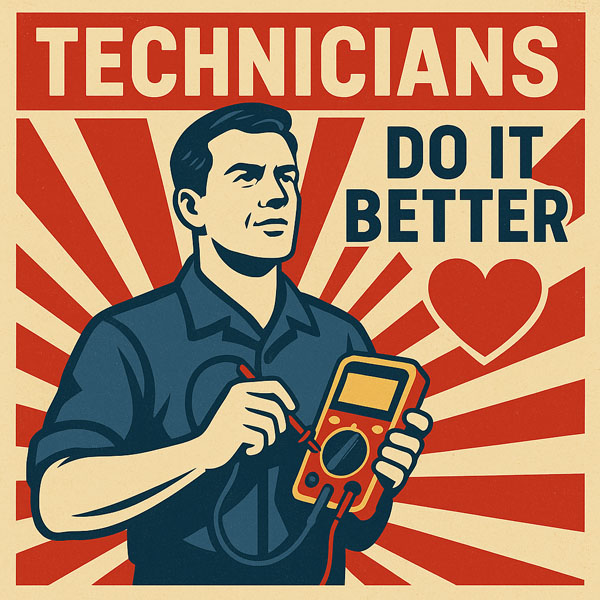Technicians Do It Better ❤️
In many companies, there’s a common belief: progress on a project always requires an engineer. But this assumption is often counterproductive.
An engineer is not always the best person for every task. Quite the opposite: in many situations, it’s the technician who delivers faster, more reliable, and more cost-effective results.
Engineers and Technicians: Different but Complementary Roles
One is not “above” the other. They are different professions, and projects succeed when each is applied in the right context.
The engineer designs, structures, chooses architectures, weighs complex trade-offs, and invents new solutions.
The technician knows their tools inside out. They can get the most out of them, deliver high-quality results quickly, automate repetitive procedures, and follow established methods with flawless consistency.
The Technician’s Strength: Operational Efficiency
A skilled technician has an intimate command of their instruments, test benches, software, or scripts. Where an engineer might spend time figuring out how to configure a tool, the technician can:
write test scenarios, execute them, and record results;
produce structured reports that are immediately useful to the wider team;
generate audits, sort and classify them to support the analysis (massive CVE triage anyone?);
automate lengthy or repetitive tasks, boosting both reliability and productivity.
In short, technicians turn tools into tangible results.
The Hidden Costs of Misallocation
Asking an engineer to perform these kinds of tasks means:
wasting budget on an overqualified resource;
slowing down the project, since the engineer may not know the tools as deeply as a technician;
increasing the risk of mistakes, if repetition leads to distraction or fatigue.
Conversely, asking a technician to design a complex architecture or validate a critical choice is risky. It may lead to weak or even wrong decisions.
A Sign of Organizational Maturity
Being able to assign the right role to the right task is a sign of organizational maturity. It also gives technicians the recognition they deserve — they’re often underestimated but are indispensable to operational success. At the same time, it allows engineers to focus on what justifies their position: designing, anticipating, and solving complex problems.
Key Takeaways
Your project doesn’t need more engineers. It needs the right balance of engineers and technicians.
That balance is what makes projects move faster, produce more reliable results, and make the best use of available resources.
At Embedded Expertise, we structure projects with this pragmatic approach: valuing the know-how of technicians while letting engineers focus where they add the most value. We can help your project too!

